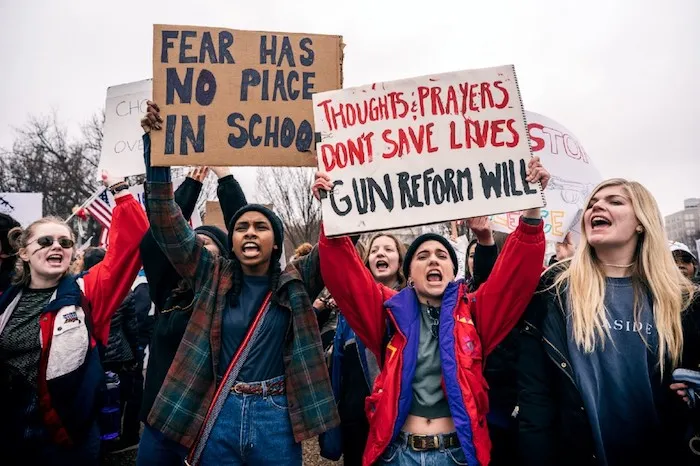Table of Contents
The murder of seventeen students on February 15 in Parkland, Florida has spurred a push for gun control stronger than any in recent memory. Under the battle cry #NeverAgain, students are staging walk-outs from their schools in an effort to lobby for an overhaul of gun policy.
Many of the protesters have publicly fretted that the resulting record of truancy will harm their college admission prospects. In response, a string of prestigious universities, including Harvard, MIT, and Yale, issued statements proclaiming that any truancy or disciplinary charges resulting from missing or disrupting school in the name of a political protest will not stand in the way of students’ admission.
As of this week, that list includes Stanford. A statement from the Office of Admissions reads, “given the nature of this national tragedy and the true and heartfelt response of students in expressing their perspectives and expectations, the University will not consider the choice of students to participate in protests as a factor in the review of present or future candidates.”
The survivors of the Parkland shooting faced a terrible tragedy. The zeal of sympathetic students nationwide is understandable and perhaps even admirable.
But in excusing disciplinary violations, universities send a grossly irresponsible message sanctioning the decision to prioritize political activism over one’s education. College is not a voting booth or an organizing center. By telling students that they should use their school time to advocate for political causes, Stanford threatens to turn itself into one.
The lofty rhetoric about national tragedy and student protest hides nothing: Stanford’s move is inexcusably partisan. The notion that Stanford, Harvard, or Yale would recognize the “true and heartfelt response” of a student who walks out to lead an anti-abortion protest in the name of saving the lives of hundreds of thousands of unborn children is, unfortunately, laughable.
Yes, mass shootings threaten students’ lives. Activists would say this justifies such egregious partisanship. But while guns do pose an indiscriminate threat to students’ lives, they are hardly the only, or even primary, issue affecting students’ well-being. Homicides, suicide, cancer, and heart disease all claim many more students' lives than mass shootings. If colleges are to provide an exemption for students clamoring for gun control, then they should also exempt the student who prefers to stay in bed and create a Kickstarter page for heart disease research instead of walking to school.
It’s hardly as if protesting gun violence is an act of self-defense. If students truly hope to defend themselves from shooting by staying out of school, shouldn’t they take the same attitude towards college and skip applying to Stanford?
Stanford could have privately admitted stellar students who are also passionate activists and excused a few disciplinary violations, without issuing a blanket letter condoning truancy. Instead, elite colleges’ public issuances represent a blatantly political stance that sends an unfortunate message to impressionable students.
Today’s politics are characterized by a dangerous combination of ignorance and raw emotion. More than eighty percent of college seniors would receive a grade of D or F on a basic survey of civics knowledge. Instead of telling students to skip school for the latest faddish, social media-inflamed cause, colleges should encourage politically-minded students to learn about the issues they’re protesting. Inculcating a stronger historical and civic understanding would inform their actions as democratic citizens far more than a cathartic walk-out.
Students can protest all they want outside of school, but they should first bother to understand the political system they are so eager to transform. Our toxic political culture is characterized by an abundance of passion over knowledge: many adults prefer to post snarky retorts on a Facebook meme group or name-call in the Breitbart comments section rather than read a book. Elite colleges shouldn’t waste their vaunted position teaching teenagers that political protests are important enough to replace learning. March on your own time.
Finally, the movement Stanford is supporting - far from an unadulterated example of grassroots student activism as portrayed in the news media - is in fact backed by powerful political interests. Last week, Buzzfeed reported that #NeverAgain, far from being a spontaneous, student-driven movement, is backed by “huge organizing groups” like Everytown, Move On LA, and the American Federation of Teachers. Legislators and political interest groups are arguably exploiting the grief of these young students to achieve their own longstanding legislative agenda: Representative Debbie Wasserman Schultz was in touch with students to help them organize since the day after the shooting.
Supposedly “impartial” elite colleges have hitched their wagons to a organized, highly funded political cause, harming students in the process. Whether students are acting on careful analysis or interest-group manipulation of their grief, excusing school-hours political activism encourages students to prioritize trendy media-driven fads over a serious education. Not to mention the decision is blatantly partisan. If you care about a few hundred thousand unborn babies as much as you care about a few hundred children, you won’t get a pass. For Stanford, playing hooky is just fine: as long as you support the right cause.





